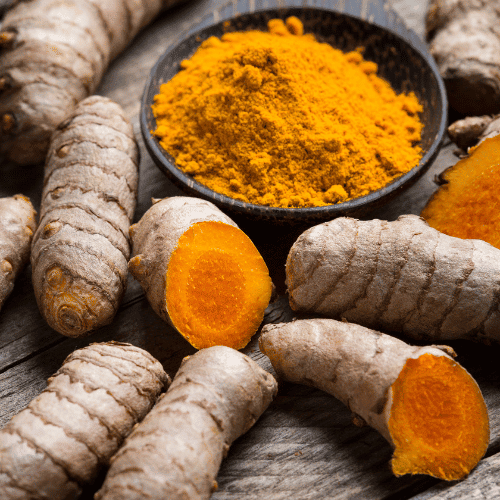Druggenius.com is reader-supported. We may earn a commission through products purchased using links on this page. Learn more about our editorial process here.
Are you searching for the optimal time to take turmeric to combat inflammation? Inflammation can be a silent adversary, causing discomfort and potentially leading to more serious health issues. While turmeric is renowned for its anti-inflammatory benefits, timing is crucial to harness its full potential.
Drawing from years of research and consultations with nutritionists, this article is tailored for the health-conscious and those seeking natural remedies. Whether you’re new to turmeric or a seasoned user, let’s embark on this journey together to discover the best time of day to take turmeric for inflammation.
Best Time of Day to Take Turmeric for Inflammation
Additionally, pairing turmeric with black pepper can enhance its bioavailability.
Understanding Turmeric and Its Benefits
What is Turmeric?

Turmeric (Curcuma longa) is a perennial, herbaceous flowering plant native to the Indian subcontinent and Southeast Asia and comes from the ginger family (Zingiberaceae). As a spice, it’s easily identifiable for its deep, golden-orange color and is used for adding color, flavor, and nutrition to foods.
At the same time, turmeric has been utilized as a medicine for thousands of years in many cultures. Historically, turmeric was used in Ayurveda and other traditional Indian and Eastern Asian medical systems, such as traditional Chinese medicine, while the Indians traditionally used it for skin disorders, the upper respiratory tract, joints, and digestive problems.
Today, turmeric is promoted as a dietary supplement for various conditions, including arthritis, digestive disorders, respiratory infections, allergies, liver disease, depression, and many others.
Turmeric’s Anti-inflammatory Properties
Turmeric is rich in health benefits thanks to curcumin, which gives it its rich yellow hue and flavor. Curcumin is the ingredient found in turmeric, responsible for its distinct yellowish pigment and many health benefits such as pain relief, lower blood pressure, stronger gut health, and anti-inflammatory properties.
Studies show that curcumin has a powerful mitigating effect on oxidative stress in the body and can increase your body’s antioxidant levels, as demonstrated by various research studies on some turmeric supplements. Curcumin can protect the body from free radicals and upregulate antioxidative protein markers Nrf2 and HO-1, suppressing cellular oxidative stress.
A study published in BioMed Central (BMC) found that curcumin could help ease osteoarthritis pain. The research involved people with knee osteoarthritis symptoms and yielded optimal results with fewer side effects among those who took curcumin and lost nearly 2% of their body weight in a month.Â
One study was done on 26 patients with active mild-to-moderate ulcerative colitis. Of the 26 patients, 53.8% achieved clinical remission, while 36.3% achieved endoscopic remission. Another study evaluated the effects of curcumin in five patients with Crohn’s disease, resulting in fewer frequent bowel movements, more formed stools, and lesser pain and cramping.
Research also shows that curcumin has shown promising results in suppressing cancer cell growth and proliferation. It has been identified to have chemo-preventive and anticancer abilities both when used alone or in combination and has been used to treat and manage cancers such as colorectal, pancreatic, breast, prostate, lung, and oral.Â
Maximizing The Efficacy of Turmeric
Use Piperine To Boost Curcumin’s Bioavailability
The curcumin present in turmeric doesn’t easily enter our bloodstream, which means we might not fully benefit from its health properties.
But there’s a solution: black pepper. Studies indicate that when curcumin is paired with piperine, a compound in black pepper, its absorption can skyrocket by up to 2,000%.
In one specific piece of research, the introduction of 20 mg of piperine to 2 grams of curcumin notably amplified its absorption.
Two prevailing theories explain this phenomenon:
- Piperine facilitates the movement of curcumin through the intestinal barrier into the bloodstream.
- Piperine might decelerate the curcumin’s breakdown in the liver, leading to elevated blood concentrations.
Thus, merging curcumin with piperine amplifies its potential health impact.
In Brief
Black pepper’s piperine acts as a catalyst, enhancing the body’s ability to absorb and utilize curcumin.
Best Time of Day to Take Turmeric for Inflammation
When is turmeric best consumed: morning, afternoon, or in the evening? Each of them may have their respective benefits:
Morning Consumption
Drinking lukewarm water mixed with turmeric powder regularly before breakfast provides detoxifying, antioxidant, and anti-inflammatory effects, making it easier to digest your breakfast while giving you an instant energy boost and increased mental focus. Similarly, it can also relieve digestive issues like ulcers and irritable bowel syndrome.
Afternoon Consumption
Post-prandial somnolence refers to the feeling of sleepiness after eating and is a normal phenomenon that most people encounter from time to time. When it happens after lunch, it’s called the post-lunch sluggishness or the 3 p.m. slump.
Consuming turmeric after lunch may help with post-lunch sluggishness. Studies show that consuming turmeric or taking curcumin supplements can considerably reduce fatigue and increase general energy.
Evening Consumption
One can drink turmeric tea in lieu of other night beverages like coffee, soda, or chocolate since it’s caffeine-free, so it doesn’t disrupt the sleep cycle. Turmeric’s bioactive component, curcumin, can lower the levels of inflammation in your body and brain, which inhibits sleep, allowing you a blissful night’s sleep.
The Verdict
Consuming turmeric at different parts of the day may offer unique health benefits. But most nutrition experts say there’s never really a wrong time to take turmeric as a food or supplement, nor does the time of day increase or enhance its bioavailability, but rather recommends consistency in taking them as prescribed, with a hearty and fatty meal to help turmeric provide the anti-inflammatory and antioxidant effects the body needs to thrive.
If we were to make a recommendation we’d say it is best to take turmeric in the morning on an empty stomach and make sure that your supplement also includes Bioperine to increase the absorption of the curcumin.
Factors to Consider When Taking Turmeric
Dosage
Curcuminoids have been approved by the US Food and Drug Administration (FDA) as “Generally Recognized As Safe” (GRAS), and clinical trials have shown good tolerability and safety profiles. Turmeric could be beneficial in doses ranging from 500-2,000 milligrams daily and safely go at doses as high as 4000 to 8000 mg/daily, depending on the condition one is taking turmeric for.
Divide your daily turmeric dose into two doses and take them 8 to 12 hours apart to help increase absorption and keep turmeric levels steady in the body. Always follow the prescribed daily amount and never go below or beyond the limit unless authorized by your healthcare provider.
Possible Side Effects
Turmeric consumption usually doesn’t cause serious side effects. However, some people tend to experience mild side effects such as the following:
- Headaches
- Dizziness
- Nausea
- Stomach upset
- Diarrhea
- Bloating
- Flatulence
- Chronic acid reflux
With or Without Food?
Food helps the body absorb turmeric, so it should always be taken shortly before or after a meal or a large, fatty snack. Curcumin is also fat-soluble, which means it dissolves in fats, so when turmeric is eaten with a source of fat, the curcuminoids attach to the fats, making them more absorbable by the gut.
However, as mentioned earlier, taking turmeric (dissolved in water) in the morning on an empty stomach before breakfast helps the body absorb the food better and yields benefits like increased energy and cognitive focus.
Turmeric vs. Curcumin Supplements
Turmeric’s roots are used to make the spice used in cooking and herbal drinks, while curcumin is the naturally occurring compound within the roots that gives it its bright yellow color and its host of health benefits.
However, there is no official consensus if one is superior at delivering health benefits since they’re almost essentially the same – both turmeric and curcumin can reduce joint inflammation, cholesterol, blood sugar, and tumor, fungal and bacterial growth. Supplements/medications containing turmeric use extracted turmeric with a high concentration of curcumin or curcumin alone.
Frequently Asked Questions (FAQs)
Can I take turmeric on an empty stomach?
Yes, you can take turmeric on an empty stomach, preferably in the morning before breakfast, to improve digestion and increase bioavailability. However, since curcumin is a fat-soluble compound, it’s best to take turmeric after a large (preferably fatty) meal to better experience its benefits.Â
How long does it take for turmeric to reduce inflammation?
Most people experience the positive effects of turmeric within a few days to a few weeks of starting the regimen. However, some people may have different biological responses to the spice, supplement, or medication, so it may take more prolonged, consistent use to see visible results.
Can I take turmeric with other medications?
Anticoagulant/antiplatelet drugs, which slow blood clotting, interact with turmeric. Turmeric might slow blood clotting and increase the risk of bruising and bleeding. Taking turmeric with diabetes medications might cause blood sugar to drop too low, while turmeric’s antioxidant properties can diminish the effects of anti-cancer medications.Â
Turmeric can also interact with sulfasalazine, estrogen, immunosuppressive drugs, and certain antibiotics.
Are there any side effects of taking turmeric daily?
Taking turmeric may sometimes cause headaches, dizziness, nausea, stomach upset, bloating, flatulence, and chronic acid reflux.
Can I cook with turmeric and still get its anti-inflammatory benefits?
Most researchers agree that cooking with turmeric does not diminish its benefits and may even increase its efficiency, especially when boiled.
Conclusion
Consuming turmeric is a great way to improve one’s health and get innumerable health benefits necessary to live a healthy lifestyle. While there is no ideal time of the day to take turmeric, what matters is that it should be taken consistently, preferably after a (fatty) meal, to help increase absorption.
To help you get started with a turmeric regimen, you can consult a nutritionist or your trusted healthcare provider to guide you through diet tips, ideal dosages, and other best practices for you to maximize turmeric’s benefits.Â
Disclaimer: this article does not constitute or replace medical advice. If you have an emergency or a serious medical question, please contact a medical professional or call 911 immediately. To see our full medical disclaimer, visit our Terms of Use page.










